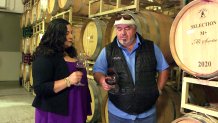When you learn the history of Rolando and Lorena Herrera, and their long journey up to opening their Napa winery, you almost can't imagine them naming the business anything other than Mi Sueño - Spanish for my dream.
Yet when Rolando first made the decision to fulfill a dream by opening his own winery, the choosing of a name began the tricky part. He consulted with friends and family. Some thought the name Mi Sueño too confusing to pronounce. Too hard to spell -- especially with the tilde over the ñ. Even though Rolando and his wife began their lives in Mexico, clawing their way up the ladder in their adopted U.S. to achieve the dream of owning their own business, he still agonized over what he would should call it.
"Just one weekend I thought about it and I woke up -- told my wife -- 'we’re doing this,'" Rolando Herrera recalled. "It’s going to be Mi Sueño."
It's a case of Herrera following his instincts and his own path -- something he's done since his childhood in Michoacán, Mexico.
Get San Diego local news, weather forecasts, sports and lifestyle stories to your inbox. Sign up for NBC San Diego newsletters.
"I’ve always been a dreamer," Herrera said, sitting in the cavernous barrel room of his Mi Sueño winery in a Napa industrial park. "I’ve always had something in my mind I wanted to do."
He was eight years old when his father moved the family from the state of Michoacán in Mexico to the Napa Valley. Herrera loved the vineyards of Napa - the abundance of opportunity he could sense even as a kid. So a few years later when his father decided to retire and return to Mexico, Herrera talked the family into allowing him to move back to Napa with his older brother. He enrolled himself in ninth grade at Napa High School and a few days later got a job washing dishes at the swanky Auberge du Soleil restaurant.
"That’s the beauty of this country," he said, "it’s a country of immigrants."
California
Not far away, Lorena Herrera had moved with her family -- also from Michoacán -- to Sonoma where her father worked in the vineyards. She grew-up with the rotating cycles of bud to grape to harvest, working alongside her siblings in the vineyards. She and Rolando met in the summer of 1986 as the wine country sun was putting its finishing touches on the grape crop.
"When I first met Rolando there was something special about him," Lorena remembered. "He was always very ambitious."
His ambition took him from the dishwashing gig to a job working at the prestigious Stag's Leap Winery as a field hand. He had never seen a wine tank or even a wine barrel before. But he felt an instant connection.
"I fell in love with this industry," he said. "I’m like 'wow, what is this?'"
Over the next ten years he'd work his way up through the trade, collecting and distilling knowledge, climbing the ladder until he became a cellar master. He began to dabble with his own winemaking, becoming more and more proficient at the process, using friends and family as a barometer of his growing skills.
Then in 1997, came two major life events; he and Lorena got married. And the couple opened their winery, Mi Sueño in name, and action.
"I just came up to my wife one day and said 'listen, I think we should buy our own grapes, make wine,'" Herrera said, "prove to myself that I’m ready to make wine,"
Since that leap of faith, Mi Sueño has become one of the stalwarts of the Napa wine region, producing numerous varietals under several brands. Beyond that, Herrera has taken to making special releases, making a batch of wine from his best four or five barrels and dedicating a release to each of his six children, and one for Lorena.
"We wouldn’t be here or be who we are if it wasn’t for my wife’s support," he said.

This year, after continued nagging from his family, Herrera finally made a special batch for himself. The back of each of his special run of bottles listed its color, taste and aroma as 100 percent chingon -- which Herrera translated as meaning fantastic, divine - or badass. He said it speaks to his very nature of giving everything 100 percent effort.
"I live by that," he said.
On a recent day, above the din of the winery's bottling machine, Herrera watched the bottles of his own special reserve transported down a conveyer belt and passing through an automated corking machine. He plucked bottle after bottle from the line, engraved with a special Herrera label, polishing each with a cloth and making sure every detail was perfect. Further down the line, several of his children helped pack the bottles into boxes.
In an industry where immigrants bear the brunt of the field labor, Herrera has risen to a place in winemaking few of his peers have. And yet, he still returns to the vineyards nearly every day to work the vines, check the grapes and to feel the soil beneath his feet. He said his role now as a farmer and winemaker is to instill in his six children, pride and a strong work ethic.
"Being poor and suffering and hungry and cold and shoeless, does that make you strong?" Herrera pondered. "Absolutely!"
Only, Herrera hopes to educate his children on the value of hard work without them having to directly walk the same hard journey he did. In other words -- the universal dream of every immigrant. Or in the Herreras' case, Mi Sueño.
"Being born in Mexico, being a Mexican, I love my culture, I love my family," he said. "I come from very humble beginnings, but I couldn’t be more proud to say that, to display that, to share that."



